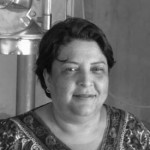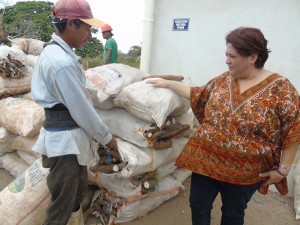
Blanca Lacayo Ortíz (’93, Nicaragua)
In the early 90s, Nicaragua was transitioning from war to peace. The country’s public universities were facing serious economic problems, and had Blanca not received a scholarship from the W.K. Kellogg Foundation to attend EARTH, her educational future would have been uncertain. Deeply grateful for the opportunity, Blanca attributes her personal and professional development to EARTH and to her professors.
“Now that more than 20 years has passed, I can confidently say that it was an extraordinary gift to have received the knowledge and experience of these professors. They were chosen to prepare us for a changing world,” she affirms.
Since graduating, Blanca has accumulated more than 20 years of experience in the management and leadership of social, economic, and environmental development projects in Nicaragua. In addition, she has implemented concrete actions in the areas of water and sanitation, conservation, agroforestry systems, agroindustry, certifications and value chains.
After completing a Master’s in the Management and Silviculture of Natural Forests at CATIE, she returned to her native Bluefields, Nicaragua where she was hired by URACCAN during that university’s first year. While in that role she worked as a socio-economic-environmental advisor for a transportation project funded by DANIDA (the Danish Development Assistance Program). Later, from 1998 to 2008, Blanca coordinated a bilateral program funded by the Inter-American Development Bank (IDB) in the departments of Jinotega and Matagalpa. When the program concluded, she joined La Cuculmeca to lead a program funded by the Spanish Agency for International Development Cooperation.
 Since 2014, she has worked at Opportunity International as a coordinator for another IDB program, developing an innovative entrepreneurial value chain model for cassava farmers in the South Caribbean Coast Autonomous Region and South Pacific zone of Nicaragua. She leads of a team of 15 people, and has helped establish a processing plant for cassava flour and starch—carving out a new industry in Central America. The project directly benefits 1,300 families with technical assistance, training, seeds, harvest collection, and co-ownership models, among other actions aimed at improving their harvest and incomes.
Since 2014, she has worked at Opportunity International as a coordinator for another IDB program, developing an innovative entrepreneurial value chain model for cassava farmers in the South Caribbean Coast Autonomous Region and South Pacific zone of Nicaragua. She leads of a team of 15 people, and has helped establish a processing plant for cassava flour and starch—carving out a new industry in Central America. The project directly benefits 1,300 families with technical assistance, training, seeds, harvest collection, and co-ownership models, among other actions aimed at improving their harvest and incomes.
Over the course of her career, Blanca says that the three programs she developed have become national models for economic, social, and environmental development.
“These projects have been, for the most part, targeting small and mid-scale farmers, and have resulted in changes in behavior and economic indicators; all the while focusing on the sustainability of the interventions, and ethical values like responsibility, respect to the environment, and honesty.”












